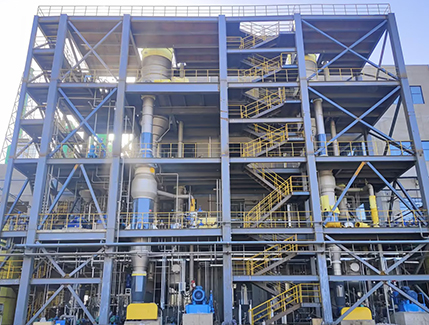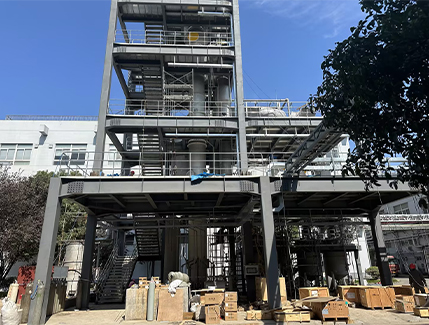

Evaporation Crystallization Technology
Your Trusted Supplier of Evaporation Crystallization Technology
At Myande Group, we pride ourselves on over 20 years of expertise in delivering comprehensive evaporation crystallization solutions across a diverse range of industries. Our cutting-edge technology and turnkey engineering services cater to sectors such as Seawater Salt Production, Lithium Extraction from Ores, Lithium Battery Recycling, Waste Salt Resource Utilization, Industrial Wastewater Zero Discharge, Bio-fermentation, and the Food and Beverage Industry.
Our commitment to excellence encompasses every stage of the project lifecycle, from initial consulting and process design to advanced 3D modeling, precise equipment manufacturing, and seamless installation and commissioning. We ensure that our clients receive unparalleled support through thorough training programs and responsive after-sales service, solidifying our reputation as a trusted partner in driving industrial innovation and efficiency.
Customize Evaporation Crystallization Technology for Your Projects!
Welcome to Myande Group's advanced evaporation crystallization equipment manufacturing base, a hallmark of industry excellence. Spanning 130,000 square meters, our facility is an epitome of modern engineering, featuring an integrated design, research and development, and manufacturing hub.
Our engineering technology center and intelligent manufacturing base represent the highest standards in the industry. With a rigorous and comprehensive quality control system, we ensure zero defects in every piece of equipment we produce. This commitment to perfection guarantees that our customers receive only the finest products, crafted with precision and care.
500+ Projects Installed Worldwide










.jpg)










Battery Material Industry
The rapid growth of the battery industry has led to increased demand for essential materials like cobalt sulfate, nickel sulfate, manganese sulfate, and Li2CO3. Evaporation and crystallization technologies are pivotal in the production process, directly impacting material quality and battery performance.
For Li2CO3 and lithium hydroxide production, lithium sulfate extracted from lithium spodumene and lithium mica undergoes evaporation concentration before precipitating Li2CO3. Both crude and refined lithium hydroxide also require evaporation and crystallization. The final stages of nickel sulfate, cobalt sulfate, and manganese sulfate production involve evaporation and crystallization.
Mechanical Vapor Recompression (MVR) technology stands out for its energy efficiency and advantages in evaporative crystallization. Proper use of MVR evaporation ensures effective salt solution evaporation and crystallization for various battery materials. Compared to traditional methods, MVR evaporation offers significant energy savings, stability, and automation.

Power Battery Recycling
As the demand for lithium-ion power batteries grows, so does the need for efficient recycling to recover valuable materials like lithium, cobalt, and nickel. Myande Group offers advanced equipment and technology for the battery recycling industry, including MVR (Mechanical Vapor Recompression) evaporation and crystallization, multi-effect evaporation, and cooling crystallization technologies. Our comprehensive solutions are designed to enhance the efficiency and effectiveness of the recycling process, ensuring the highest recovery rates of valuable metals and materials.

Industrial Wastewater Treatment
Myande Group stands at the forefront of providing comprehensive solutions for the resource recovery and treatment of industrial wastewater. With our expertise in evaporation crystallization technologies, we offer tailored solutions to address the challenges of salt separation and recovery in wastewater treatment. Our advanced equipment and technologies enable efficient concentration, crystallization, and separation of salts from wastewater streams, ensuring high purity and quality of recovered salts.

Amino Acid Production
Leveraging our robust R&D capabilities and extensive industry experience, Myande's solutions are designed to optimize the entire evaporation and crystallization process, minimizing energy consumption while maximizing product quality. Our advanced evaporation technology significantly enhances the efficiency and purity of amino acid extraction and adapts to the specific needs of different amino acid products. This ensures that heat-sensitive components remain intact during the crystallization process, preserving the biological activity of the amino acids.
Through the integration of intelligent control and automation systems, Myande's solutions enable precise management of the production process, enhancing both flexibility and stability. This paves the way for amino acid manufacturers to achieve high-efficiency, sustainable production, meeting the growing demands of the market.

Erythritol Production Industry
Myande's MVR evaporation and concentration, along with crystallization solutions, are tailored specifically for the polyol industry. These solutions ensure high purity and quality crystallization of erythritol while significantly improving production efficiency. By precisely controlling temperature and pressure, our technology effectively prevents the degradation of heat-sensitive components, preserving the natural attributes and health benefits of erythritol. This meets the market demand for low-sugar, low-calorie, and high-nutritional-value products.

Food and Beverage Industry
Myande Group offers MVR evaporation and crystallization technologies tailored for the food and beverage industry. Our solutions ensure efficient concentration and purification of ingredients, as well as treatment of wastewater discharged from production process, enhancing product quality and sustainability.
-Dairy Production
-Fruit Juice Production
-Edible Oil Production
-Food Processing
-Sugar from Beets and Cane
-Wine Production
-Distilling & Beer Production
One-stop Solution Tailored to Your Needs

General Layout Plan
With a land prepared, the next thing you should consider is planning the general layout, which is a crucial foundation of a sustainable and cost-effective manufacturing.
Turn to us for help and we will present you the design for your plant by considering water, steam, electricity supply and etc.

Process Design
Combining our engineering expertise, industry know-how and practical skills with your knowledge, we provide the optimized and customized process design for your plant.

3D Plant Design
On the basis of plant layout design, combined with real situation, we can design a three-dimensional model of the entire plant. All the equipment, piping and instruments, any detail can be shown in the model, not only allowing you to have an intuitive understanding of the plant, but also providing overall information support for plant construction, equipment installation and future expansion.

Automatic Control System
We offer economical and most effective process automation solutions for the entire production line. Our RES automatic control system is developed based on PLC/DCS system.

Data Integration
Data integration in industrial evaporation and crystallization systems enables real-time monitoring and automated control, coordinated operation, data analysis, advanced process control, remote diagnostics, and integration with enterprise systems, leading to optimized performance and operational excellence.

Equipment Manufacturing
We owns in-house manufacture base of more than 130,000㎡ integrating R&D, production, project management which represents advanced engineering capability in the industry.

Installation and Commissioning
After finishing the installation of all machines, we offer on-site commissioning service to ensure compatible functioning.
Every move of the machine needs strong technical support from our experienced engineers. The only principle is that you can start manufacturing right after the commissioning.

Training and After-sales Service
Myande 360° Service Portfolio covers all your needs throughout the life cycle of your project. By minimizing your total cost of ownership, we help you stay ahead of the competition.

Intelligent Tube Sheet Robot Welding System
By harnessing the power of the Intelligent Tube Sheet Robot Welding System, we have revolutionized the way evaporators are crafted, taking efficiency and precision to unprecedented heights.
At the core of our remarkable evaporator lies the Intelligent Tube Sheet Robot Welding System, a state-of-the-art technology that has redefined the welding process. By automating this intricate task, we eliminate the margin for human error, ensuring flawless connections between tubes and sheet metal. The result is an impeccable product that exceeds industry standards.

No Compromise on Quality
We are highly committed to Quality Assurance.
Our facilities and processes adhere to the highest local and international industry standards and certifications and are audited regularly for compliance.
With a global quality management system, we ensure that our customers all over the world receive high-quality, reliable products and solutions. We are well aware that our equipment have to function safely and efficiently for decades.
To effectively carry on the spirit of artisanship, improve the overall quality of front-line employees, we hold the “Workmanship Skills Competition" every year.



Certificates & Patents
At Myande, innovation is the result of the total process of developing an idea into a product or a new way of working which adds value to the business.
Over 500 registered patents and utility models demonstrate the company's innovation potential.

Our Global Presence
We focus on supplying one-stop engineering service covering general layout plan, process design, R&D, equipment manufacturing, automatic control system, data integration, installation, supervision, commissioning, training and etc.
Our custom solutions come from a deep understanding of your needs, and we have the capability to complete each project from the design of the initial concept to manufacturing, installation, commissioning and delivery.
FAQ
-
How to Choose a Reliable Turnkey Engineering Solutions Provider?
-
Selecting a dependable turnkey engineering solutions provider is crucial for the success of your project. Here are key factors to consider:
1. Comprehensive Services: Look for a provider that offers a full spectrum of services, including consulting, process design, 3D design, equipment manufacturing, installation and commissioning guidance, training, and after-sales support. This ensures seamless project execution from start to finish.
2. Industry Expertise: Choose a provider with proven experience and expertise in your specific industry. A deep understanding of industry-specific requirements and challenges ensures tailored solutions that meet your unique needs.
3. Quality Control: A robust and rigorous quality control system is essential. Ensure that the provider adheres to stringent quality standards to guarantee defect-free products and reliable performance.
4. Innovation and Technology: Opt for a provider that embraces the latest technologies and innovations. Advanced engineering capabilities and state-of-the-art manufacturing facilities contribute to superior solutions and enhanced efficiency.
5. Track Record and Reputation: Research the provider's track record and reputation in the industry. Positive testimonials, case studies, and a history of successful projects are strong indicators of reliability and competence.
6. Customer Support: Reliable customer support and comprehensive after-sales service are vital. Ensure the provider is committed to ongoing support and can address any issues promptly and effectively.
By considering these factors, you can confidently select a turnkey engineering solutions provider that will deliver exceptional results and drive the success of your project.
-
-
What is the process of crystallization in wastewater treatment?
-
Crystallization is a separation process used in wastewater treatment to remove dissolved salts and impurities from water. This method is particularly effective when dealing with wastewater that contains high concentrations of inorganic salts, heavy metals, or other dissolved solids. The basic process of crystallization involves inducing the dissolved substances to form solid crystals, which can then be separated from the water.
Here's an overview of the typical process of crystallization in wastewater treatment:
1. Pre-treatment: Before the crystallization process begins, the wastewater often undergoes pre-treatment steps to remove larger particles, organic matter, and other contaminants that could interfere with the crystallization process.
2. Cooling or Evaporation: Crystallization can be achieved through either cooling or evaporation. In the cooling method, the wastewater is cooled down to reduce its solubility for the dissolved salts. As the temperature drops, the solubility limit is reached, causing the salts to precipitate and form crystals. In the evaporation method, the wastewater is subjected to controlled evaporation, which again leads to the concentration of salts beyond their solubility limits, resulting in crystal formation.
3. Nucleation: Nucleation is the initial step in crystallization, where tiny crystal particles (nuclei) begin to form in the supersaturated solution. The rate and size of nucleation can significantly influence the efficiency and characteristics of the crystallization process.
4. Crystal Growth: Once the nuclei form, they serve as sites for further crystal growth. Solids continue to accumulate onto these nuclei, gradually forming larger crystals. The growth process can be influenced by factors such as temperature, concentration, and the presence of impurities.
5. Separation: As crystals grow, they become denser than the surrounding liquid and eventually settle at the bottom of the crystallization vessel. Depending on the scale of the operation, various separation methods can be employed, including sedimentation, centrifugation, or filtration, to separate the solid crystals from the remaining liquid.
6. Washing (Optional): After separation, the collected crystals might undergo a washing step to remove any adhering impurities or residual mother liquor (the liquid portion from which crystals precipitate).
7. Drying: The washed crystals are usually still wet, so they need to be dried to achieve the desired moisture content. Drying can be achieved through various methods such as air drying, vacuum drying, or using specialized drying equipment.
8. Disposal or Recovery: The recovered crystals can be disposed of in an environmentally responsible manner or potentially recycled or reused, depending on the composition of the crystals and the specific goals of the wastewater treatment process.
It's worth noting that the effectiveness of the crystallization process depends on various factors including the nature of the dissolved substances, the characteristics of the wastewater, temperature, pressure, and other operational parameters. Additionally, the choice between cooling and evaporation methods will depend on the specific circumstances and objectives of the wastewater treatment facility.
-
-
What are the advantage and disadvantage of crystallization over evaporation?
-
Crystallization and evaporation are both valuable separation and concentration processes, but they have distinct advantages and disadvantages depending on the specific application and requirements. Here's a comparison of the two processes:
Advantages of Crystallization:
1. Purity Enhancement: Crystallization often leads to higher levels of purity compared to evaporation. The selective formation of crystals can effectively separate impurities from the desired product.
2. Selective Recovery: Crystallization allows for the selective recovery of specific substances from complex mixtures, which might be challenging to achieve with evaporation alone.
3. Resource Efficiency: Crystallization can be more energy-efficient in cases where the process relies on the heat of crystallization (the heat released or absorbed during crystallization) to drive the separation, reducing the need for external heating or cooling.
4. Product Quality: Crystallization can produce high-quality, well-defined crystals that meet certain size and shape specifications, which is important in industries like pharmaceuticals and specialty chemicals.
5. Waste Minimization: Crystallization can be used for efficient removal of dissolved contaminants from wastewater, minimizing the volume of waste generated.
Disadvantages of Crystallization:
1. Complexity: Crystallization processes can be complex and sensitive to various factors such as temperature, supersaturation, and impurities, making process control and optimization challenging.
2. Slow Process: Crystallization processes are often slower compared to evaporation due to the time required for nucleation and crystal growth.
3. Equipment and Maintenance: Crystallization equipment can be more intricate and require careful maintenance due to the need to control nucleation and crystal growth.
4. Higher Capital Costs: Crystallization setups can have higher initial capital costs compared to simple evaporation systems.
Advantages of Evaporation:
1. Simplicity: Evaporation is a straightforward process that involves heating a solution to remove water and concentrate the solutes.
2. Faster Process: Evaporation is generally faster than crystallization since it does not require the additional time for crystal formation and growth.
3. Lower Capital Costs: Evaporation systems can be simpler and more cost-effective to set up compared to complex crystallization systems.
4. Versatility: Evaporation can handle a wide range of solutions and substances without requiring extensive adjustments.
Disadvantages of Evaporation:
1. Purity Limitation: Evaporation may not achieve the same level of purity as crystallization, as it does not offer the same degree of selective separation.
2. Energy Intensive: Evaporation processes can be energy-intensive, especially when dealing with solutions with high water content.
3. Impurity Concentration: In some cases, evaporation can lead to the concentration of impurities along with the desired product.
4. Limited Selectivity: Evaporation may not be as effective for selectively separating different components of a mixture.
In summary, the choice between crystallization and evaporation depends on the specific objectives of the process, the nature of the substances being processed, the desired level of purity, the efficiency considerations, and the available resources. In many cases, these processes can also be combined in a multi-step approach to achieve the desired results.
-
-
How is lithium extracted from spodumene ore?
-
Lithium is extracted from spodumene ore using the following steps, including the application of evaporative and crystallization technology:
1. Crushing: Spodumene ore is crushed into smaller particles to increase its surface area.
2. Roasting: The crushed ore is roasted to convert spodumene to a more reactive form.
3. Sulfuric Acid Digestion: Roasted ore is treated with sulfuric acid to form lithium sulfate solution.
4. Leaching: The lithium sulfate solution is leached to separate it from impurities.
5. Purification: The solution undergoes purification to remove unwanted elements.
6. Evaporative Crystallization: The purified solution is concentrated using evaporation, causing lithium to crystallize.
7. Harvesting Crystals: Crystals of lithium compounds are collected as they form.
8. Washing and Drying: Collected crystals are washed and dried to remove residual impurities and moisture.
9. Conversion: Dried crystals are converted into battery-grade lithium compounds like Li2CO3 or lithium hydroxide.
Evaporative and crystallization enhance the efficiency of lithium extraction by concentrating the solution and facilitating crystal formation, aiding in the separation and recovery of lithium from spodumene ore.
-
-
What is the process of lithium refinery?
-
The process of lithium refining involves the following steps:
1. Ore Preparation: Crush and roast lithium-containing minerals, like spodumene, to make them reactive.
2. Sulfuric Acid Digestion: Treat roasted ore with sulfuric acid to create lithium sulfate solution.
3. Impurity Removal: Purify the solution to eliminate unwanted elements.
4. Li2CO3 Precipitation: Precipitate Li2CO3 using soda ash.
5. Filtration and Drying: Separate and dry the Li2CO3 crystals.
6. Conversion: Convert Li2CO3 to battery-grade lithium compounds.
7. Evaporative Crystallization (Optional): Concentrate and crystallize lithium from solution through evaporation.
8. Washing and Drying (Optional): Wash and dry the crystallized lithium compounds.
9. Final Product: Obtain high-purity lithium compounds ready for various applications.
This process yields refined lithium compounds suitable for industries like batteries, electronics, and pharmaceuticals.
-
Contact Us
Contact us to see how we can help you grow your business.
Find the solution to an optimized future.








